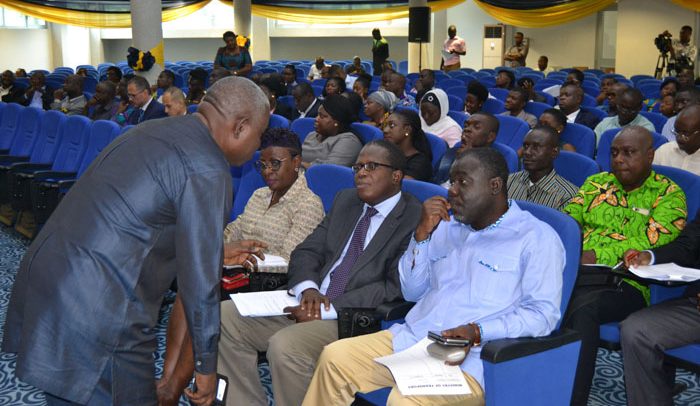Kwaku Ofori Asiamah interacting with a director
The Ministry of Transport, in collaboration with the Department of Roads & Highways, Ghana Railway Development Authority, Aviation Ministry, among other related sectors, has held a day’s review workshop on the Draft National Transport Policy.
The Minister of Transport, Kwaku Ofori Asiamah, in an address to the stakeholders at the Ghana Shippers Authority (GSA) conference room in Accra on Thursday indicated that the current National Transport Policy was developed in 2008 to provide “guidance for holistic and strategic development of our transport and logistics sector to support the Ghana Gateway Project at the time.”
He explained that international best practices require the policy is constantly reviewed to correspond with the changing demands and national strategic objectives and emerging issues in the transport sector of the national economy of each country.
According to him, the socio-economic survival of the nation depends on the extent to which it revamps its railways, improves the ports and inland water transport, as well as improve the state of the roads and modernise airport infrastructure to facilitate development.
“Government under the leadership of President Nana Addo Danquah Akufo-Addo equally recognizes the transport sector as having a critical role to play in the transformational and industrialization economy and which must contribute greatly to helping to the achievement of the Ghana Beyond Aid Agenda,” he stated.
“In the light of exercising our mandate, the Ministries of Transport, Roads and Highways, Railways Development and Aviation with funding support under the Transport Sector Project (TSP) went through a public procurement process to engage a consortium comprising Messrs Vision Consult/Plan Consult and Sustainability Works of the United Kingdom to undertake a holistic review of the 2008 National Transport Policy,” he explained.
The minister commended the consortium for the intensive and extensive consultations with various groups and institutions, including Parliamentary Select Committees on Roads and Transport, Health, Education, Food & Agriculture, Poverty Reduction Strategy, as well as Gender, Children and Social Protection during the period of consultations.
He expressed hope that participants at the stakeholder’s workshop would equally consolidate the gains to come out with a workable National Transport Policy document to help achieve the agenda of government.
By Solomon Ofori


